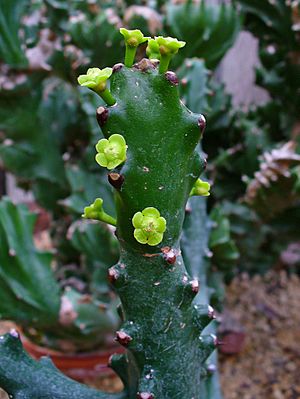Euphorbia antiquorum facts for kids
Euphorbia antiquorum is a fascinating plant that loves dry places. It's known as a xerophyte, which means it's specially adapted to live in areas with very little water, like deserts or rocky regions. This plant was first mentioned by a famous scientist named Carl Linnaeus in 1753. Later, another scientist, León Croizat, described a similar plant called Euphorbia mayuranathanii. He named it after an Indian botanist, Pallassana Vaithipattar Mayurnathan, who found it near Chennai (which used to be called Madras).
In Hindi, this plant is sometimes called त्रिधार (Tri-dhaar). Even though scientists have studied it a lot, no different types or "varieties" of Euphorbia antiquorum are officially recognized today.
What Makes This Plant Special?
Euphorbia antiquorum is part of a large group of plants called Euphorbia. Many plants in this group are succulents, meaning they have thick, fleshy parts that store water. This helps them survive long periods without rain.
Living in Dry Climates
As a xerophyte, Euphorbia antiquorum has developed special ways to save water. Its stems might be thick and waxy, and its leaves might be small or even absent. These features help reduce how much water the plant loses to the air. It's a great example of how plants adapt to tough environments!
How It Got Its Name
The name Euphorbia antiquorum means "ancient Euphorbia." Carl Linnaeus, who created the system we use to name plants and animals, first identified it. The plant Euphorbia mayuranathanii was named to honor Pallassana Vaithipattar Mayurnathan, an Indian botanist. He collected many plants and helped scientists learn more about them.
See also
 In Spanish: Euforbio malayo para niños
In Spanish: Euforbio malayo para niños


